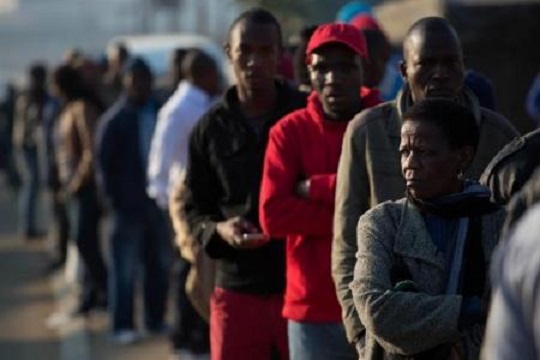
By Nqobile Dludla and Mfuneko Toyana
JOHANNESBURG/PRETORIA (Reuters) – South Africans voted in local elections on Wednesday that could see the ruling African National Congress (ANC) and its scandal-hit leader lose control of the capital and other key cities for the first time since the end of apartheid.
Many queuing in the winter cold said they were worried about President Jacob Zuma’s performance and the state of Africa’s most industrialised economy, where one in four is unemployed the central bank expects zero growth this year.
Analysts say the ANC is facing the toughest electoral challenge in its history – a narrow win in key cities would still be a significant blow for a movement which embodied South Africa’s liberation struggle. Its next major test comes in national elections in 2019.
“Where I live I don’t have electricity and we use paraffin stoves to cook. We’re struggling. For 22 years the ANC has been in power but nothing has changed,” said Philemon Mathebula, an unemployed 35-year-old from Johannesburg.
He told Reuters he had switched his allegiance to the main opposition Democratic Alliance party, a historically white-dominated movement that is hoping for growing support under its new black leader Mmusi Maimane.
Opinion polls see a particularly close race in the capital Pretoria, economic-hub Johannesburg and the symbolic Nelson Mandela Bay municipality named after the anti-apartheid icon. The Democratic Alliance was expected to keep hold of Cape Town, the only major city not run by the ANC.
“The vote will be a referendum on Zuma and the performance of his government on the national economy as well as the local level,” said BNP Paribas Securities South Africa political analyst Nic Borain.
ZUMA SCANDALS
“I’m voting because I want access to electricity and water and other services. Unemployment is rife and I think voting will help change that,” said pensioner William Mahlangu in Pretoria, declining to say whom he was backing.
Security guard Senzo Makhubela said the ANC needed to build more houses and do more to develop areas like Diepsloot, the shantytown where he lives north of Johannesburg.
But he was sticking with the ruling party for now, despite the travails of its leader. “Zuma doesn’t make decisions alone so the ANC is not Zuma alone, it’s a collective. They just need to change a few things,” said the 32-year-old.
Zuma survived an impeachment vote in April after the Constitutional Court said he breached the law by ignoring an order to repay some of the $16 million in state funds spent on renovating his home.
In December, he was widely criticised for changing his finance minister twice in a week, sending the rand plummeting and alarming investors. The rand has since recovered.
Zuma has said he would repay some of the funds spent on his home and rejected the accusations, saying he is fit to lead.
But anger is rising in a country on the brink of recession. Analysts predict a downgrade by ratings agencies to “junk”.
The leftist Economic Freedom Fighters (EFF) led by firebrand Julius Malema, Zuma’s one-time protege and former ANC youth leader, is another challenger. Malema plans to redistribute among poor blacks wealth still largely held by whites.
Edward Mariba, 44, in Johannesburg said he voted for the EFF. “I wanted to give the new kids on the block a chance.”
ANC loyalists said they remained confident
On the east coast, Danny Jordaan, the ANC mayor in Nelson Mandela Bay municipality said he expected the ANC to win at least 55 percent of the vote.
“The ANC will win,” said Stonie Sizani, a 62 year old civil servant and lifetime ANC supporter in the region’s main city Port Elizabeth. “Any party would find it difficult with a struggling economy. The global economy is bad, not just South Africa.”
A Reuters witness said voting was delayed after roads leading to some polling stations in Vuwani town in the northern Limpopo province were blocked overnight by unknown people.
Some locals had said they would boycott the vote, protesting against a change in municipal boundaries which led to riots in May after residents said social services would suffer.
The government has said it deployed 2,000 troops to hotspots countrywide to prevent any violence, including in Vuwani.
“I have just voted so that whoever is elected can enrich themselves, maybe one day I’ll be lucky and they can look after me,” said a 27-year old man in Vuwani, who declined to give his name for fear of reprisals from residents calling for a boycott.
(Additional reporting by Sipiwe Sibeko in Limpopo, Tanisha Heiberg in Johannesburg, Joe Brock in Port Elizabeth and Wendell Roelf in Cape Town; Writing by James Macharia; Editing by Andrew Heavens)
